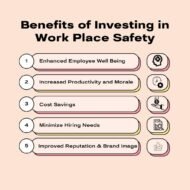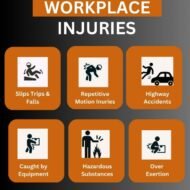Currently Browsing: Employee Safety
Posted by Managementguru in E Commerce, Employee Safety
on Dec 11th, 2023 | 0 comments

In the dynamic landscape of industry, staying ahead of the curve is not just a preference; it’s a necessity. Specialized certifications play a pivotal role in enhancing professionals’ skills, ensuring compliance with industry standards, and fostering a culture of continuous improvement. Among the plethora of certifications available, some stand out as particularly beneficial for individuals and companies in the industrial sector. ISNetworld: Elevating Safety and Compliance In the realm of industrial certifications, ISNetworld stands tall as a comprehensive platform that connects companies with safe and reliable contractors. Tailored specifically for the industrial sector, ISNetworld emphasizes safety, compliance, and performance. The ISN certification is instrumental in streamlining the contractor qualification process, providing a centralized database for essential documentation, and facilitating collaboration among industry stakeholders. One of the primary advantages of ISNetworld is its ability to enhance safety performance. Through rigorous evaluation and benchmarking, the certification ensures that contractors adhere to the highest safety standards. This not only minimizes the risk of accidents and injuries but also contributes to the overall well-being of the workforce. Moreover, ISNetworld serves as a valuable tool for maintaining regulatory compliance. As regulations in the industrial sector are constantly evolving, having a certification that keeps pace with these changes is invaluable. By staying compliant, companies can avoid costly penalties, legal complications, and reputational damage. AWS Certified Welding Inspector: Ensuring Structural Integrity In the industrial landscape, welding plays a crucial role in ensuring the structural integrity of various components. The American Welding Society (AWS) offers a certification program specifically designed for welding inspectors. Becoming an AWS Certified Welding Inspector demonstrates a professional’s proficiency in assessing the quality and safety of welded structures. This certification is beneficial for individuals involved in welding inspection, quality control, and supervision. It covers a range of essential topics, including welding processes, metallurgy, and inspection techniques. By earning this certification, professionals contribute to the overall reliability of industrial structures, reducing the likelihood of structural failures and associated risks. Six Sigma Certifications: Driving Process Excellence Process efficiency is a cornerstone of success in industrial settings. Six Sigma certifications, offered by organizations such as the International Association for Six Sigma Certification (IASSC) and the American Society for Quality (ASQ), empower professionals with the tools and methodologies to streamline processes and eliminate defects. Whether it’s the Yellow Belt, Green Belt, or Black Belt certification, each level of Six Sigma signifies a deeper understanding and application of process improvement principles. These certifications are particularly beneficial for industrial professionals involved in production, quality control, and operational excellence. By adopting Six Sigma practices, organizations can enhance productivity, reduce waste, and ultimately improve their bottom line. In the competitive landscape of industrial industries, specialized certifications are not just credentials; they are investments in excellence. ISNetworld, AWS Certified Welding Inspector, and Six Sigma certifications represent just a glimpse into the myriad of opportunities available for professionals and organizations to elevate their performance, ensure safety and compliance, and drive continuous improvement. As technology advances and industry standards evolve, staying abreast of the latest certifications will be key to navigating the complexities of the industrial sector...

Posted by Managementguru in Employee Safety, Human Resource, Productivity, Work Environment
on Jul 11th, 2023 | 0 comments

In today’s rapidly changing business landscape, organisations are constantly looking for ways to enhance their performance and maintain a competitive edge. While many factors contribute to a company’s success, one aspect that should never be overlooked is workplace safety. Investing in safety measures not only protects employees from harm but also yields significant benefits for businesses. In this article, we will explore why workplace safety is a smart business decision, considering both the immediate and long-term advantages it offers. Enhanced Employee Well-being By prioritising workplace safety, organisations demonstrate a commitment to the well-being of their employees. Safe working conditions foster a sense of trust, respect, and loyalty among the workforce. When employees feel safe and valued, their morale and job satisfaction increase, leading to improved productivity and reduced turnover rates. Something as simple as a good pair of work boots could save lives with a prevented slip, so investing in quality will be felt throughout the organisation. Increased Productivity and Efficiency Safety investments often go hand in hand with process improvements and risk mitigation strategies. Implementing safety protocols and providing necessary training equips employees with the knowledge and tools to perform their tasks efficiently and effectively. By reducing the likelihood of accidents, injuries, and illnesses, businesses can minimise downtime, maintain continuity in operations, and optimise productivity levels. Safe work environments also promote better focus and concentration, leading to higher quality output and fewer errors. Cost Savings Investing in workplace safety can result in substantial cost savings for businesses in the long run. While there may be upfront expenses associated with safety equipment, training, and compliance, these investments can significantly reduce the financial burden of accidents, injuries, and workers’ compensation claims. By preventing workplace incidents, companies avoid the direct costs of medical expenses, legal fees, and property damage. It helps to bear in mind that businesses with strong safety records often benefit from lower insurance premiums and improved employee insurance coverage terms. Improved Reputation and Brand Image Companies that prioritise safety earn a reputation as responsible and ethical employers. A strong safety culture becomes a valuable selling point for attracting top talent, as job seekers are increasingly concerned about the work environment. By creating a safe and healthy workplace, businesses can differentiate themselves from competitors and build a positive brand image that resonates with customers, partners, and stakeholders. Such a reputation can lead to increased customer loyalty, trust, and ultimately, improved business performance. Compliance with Legal and Regulatory Requirements Workplace safety is not just a moral obligation; it is also a legal requirement. Governments and regulatory bodies set specific standards and guidelines to protect employees’ rights and ensure their safety at work. Investing in safety measures allows businesses to comply with these regulations, avoiding potential penalties, fines, and legal disputes. By staying updated with safety regulations, organisations can demonstrate their commitment to ethical practices and create a culture of compliance, further bolstering their reputation. Investing in workplace safety is undeniably a smart business decision with far-reaching benefits. As businesses navigate the complexities of the modern world, incorporating workplace safety into their strategic plans is not only the right thing to do but also a wise investment that pays off in more ways than...

Posted by Managementguru in Employee Safety, Human Resource, Labor Management
on Mar 31st, 2023 | 0 comments

Workers’ compensation is a vital form of insurance that protects employees when they become injured or ill due to work-related conditions. Each state in the US has its own specific laws governing how workers’ compensation works, but there are certain commonalities that exist across all states. In this article, we will take a look at the most common causes of workers’ compensation claims and what employers can do to reduce the risk of such incidents occurring. 1. Slips, Trips and Falls One of the most commonly reported causes for workers’ compensation claims is slips, trips and falls. These accidents often occur when surfaces are wet from cleaning or spillages, when items are left unsecured and obstruct walkways, or in areas with poor lighting or inadequate signage. Employers must take steps to ensure that their workplace is clean and well-maintained to prevent accidents from occurring. 2. Repetitive Stress Injuries Repetitive stress injuries are another major cause of workers’ compensation claims. These injuries are caused by consistent strain on muscles or joints in the same position over an extended period of time. This is often due to using particular tools or machines without proper safety equipment or training. Employers should take care to ensure their staff are properly trained on how to use any necessary tools, as well as provided with the right protective equipment and encouraged to take regular breaks throughout their shift. 3. Motor Vehicle Accidents For those who drive vehicles for work purposes, whether they are company-owned cars, vans or trucks, there is always a risk of being involved in an accident while out on the roads that could result in injury or illness requiring medical attention. Employers should ensure that any vehicle used by staff members is serviced regularly and fit for purpose before it is taken out on the road. They must provide any necessary driving safety training where appropriate, to minimize potential risks of motor vehicle accidents occurring on company time. 4. Hazardous Substances Employees who come into contact with hazardous substances as part of their job role could suffer serious health issues if they are not working safely within industry standards and regulations laid out by national government bodies such as the OSHA (the Occupational Safety & Health Administration). It is important employers adequately manage their staff when it comes to handling hazardous substances by providing access to appropriate protective equipment at all times while they are engaged in work activities involving hazardous materials. 5. Manual Labor Activities The final major cause for workers’ compensation claims occurs during manual labor activities such as lifting heavy objects incorrectly or operating machinery without adequate safety precautions in place. Both scenarios would lead to employee injuries being sustained, which could require medical attention resulting in potential lost earnings due to time off work needed for recovery followed by rehabilitation exercises. By having an understanding of the most common causes of workers’ compensation claims as outlined in this article and taking the necessary actions to reduce potential risks of such incidents occurring, employers can not only help protect their employees from harm but also save their businesses money in the long...

Posted by Managementguru in Business Management, COVID 19, Employee Safety, How To, Human Resource
on Feb 1st, 2022 | 0 comments

We are living in very uncertain times and few people in this world are feeling the same as business owners at the moment. Some of them are finding themselves at the brink of bankruptcy and are barely able to keep their heads out of the water. While government assistance has helped some of them stay afloat, many also had to make major changes to the way they conduct business. Some even had to completely rethink their business model. If you’re a business owner who’s wary about the future, here are some of the things you could do to survive this pandemic. Always Stay on Top of Compliance One of the things you have to be very careful with is compliance issues. You cannot lose money on sales and get slapped with fines on top of it. This is why you need to follow vaccination and security protocols to the letter. These can get very complex, however, and if you have a big team to manage, you will need to use tech tools like the Snap COVID compliance platform to always be aware of everyone’s health and vaccination status. Look for a solution with an easy-to-use dashboard that allows you to easily comply with the most current mandates, and which allow your employees to input their vaccination status. Pivot The next thing you will have to do is pivot and either change the direction of your business, change your processes, or offer new services. Those in the restaurant business may have to turn to a delivery-only model or virtual restaurant on top of their current operation. Retailers will have to implement things like curbside pickup, contactless delivery, and consider automating checkout to limit contact if they haven’t already. Hiring a consultant here could be a great option. We would strongly suggest that you hire a COVID recovery consultant if you haven’t already. They will be able to tell you exactly what you need to do to stay afloat and offer some tips that could allow you to increase your profits during this rough time. Prevent Outbreaks You also have to do everything you can to prevent outbreaks in your business. You need to limit the number of people on the floor and reorganize workspaces to avoid contact. You also need to allow as many of your employees as possible to work remotely and adopt agile project management tools and methodologies to facilitate the process. You have to invest in regular testing as well. You should have at least 20% of your workforce tested randomly every five days, but, if you can afford it, aim for a higher percentage. Also, make sure that you clean more often and have the whole facility sanitized once every week. Workstations should be cleaned and disinfected after each shift. These are all things that you can do as a business to not only survive but possibly thrive during this pandemic. It will require the collaboration of everyone on your team, however, so make sure that everyone is on the same page...

Posted by Managementguru in Employee Safety, How To, Human Resource, Training & Development
on Jan 15th, 2022 | 0 comments

It is an unpleasant fact that accidents will happen. No one plans for them to happen, and this article doesn’t advise that you over think or prepare for every eventuality. However, it is important to have a clear idea of the processes to follow and the possible safety nets to have in place to protect against accidents in your business and in the workplace. The range of workplace accidents and injuries is wide and varied, from simple trips and slips, muscle strains, repetitive strain injuries and crashes and collisions. A clear reporting and recording process All workplaces and businesses no matter how small must have a clear process of reporting and recording any accidents, incidents, near misses as a way to improve business practice. Employees and staff must all be fully aware of the health and safety measures in place as well as who they should be reporting any safety issues to in the workplace. Insurance Insurance is primarily about ensuring that the business is covered for any accidents that might happen, from accidentally losing an electronical storage device to slipping down the stairs. Your business must have cover for accidental events that may affect business continuity. Simply wishing you had this advice at the start and the right public liability and employee protection insurances in place won’t save your business when faced with huge expenses, fines and compensation pay outs. Legal protection Having access to a professional lawyer or team of lawyers who are able to assist you with everything legal, from branding and copyright issues to labor law and more. Having the legal support to deal with accidents and business challenges is a great piece of advice for all small to medium sized businesses. You need to have a local firm that you have checked out and are prepared to use when you need them. Having this type of local legal protection makes it immediate and accessible as soon as you need it. Just as if you were in the Costa Mesa and had an accident you would look for a California Personal Injury Law Firm, you should be thinking the same for your business. Managing accidents is about having the right support at the right time and if there’s any expected litigation, make sure you have the right lawyers for the specific case at hand. Health and safety training In conjunction with first aid, health and safety training will go a long way to making employees more aware of the safety risks in the workplace. Employee health and safety in the workplace is the responsibility of all those in it and as such employees, managers and other business stakeholders must be aware of the safety standards that exist in the business and be prepared and trained to follow and adhere to these. Accidents in the workplace can vary from the immensely insignificant to those that can be life changing. By remaining mindful of this and doing some form of preparation and risk assessment around these issues that affect your workplace, will go a long way to ensuring that any accidents in your workplace are dealt with as best you can, with as little disruption to your business as is...










